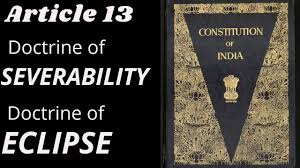The Doctrine of Severability & Doctrine of Eclipse
Introduction:
During formulation of Indian Constitution we had lot of nations as example who had adopted the concept of humanitarian and democratic. So, the founding father of our country also thought to formulate something which can reflect so many thing such as rights of minority, principles of UDHR, concept of fundamental rights, our struggle for independence etc. Therefore, while constituting Indian Constitution part-III was discussed for 38 days.
Part-III of Indian Constitution exist with objective that ‘they can protect rights and freedom from arbitrary invasion of state’. In other words we need to judge action of state in on basis of impact on people rights and freedom. And this entire concept is covered under article 13.
Article 13 talks about four basic principles about fundamental right. The very basic thing is that from which period fundamental rights are in existence? The fundamental rights exists from the day on present Constitution came into existence i.e. 26th January 1950.
ARTICLE 13- Deals with pre-constitutional laws
It says before the commencement of constitution before 26th January 1950 our country has so many laws. And after constitution came into force we had fundamental rights. Therefore, 13(1) says that those laws which are not in consistent with fundamental rights those laws will be considered as void. And all those laws which are consistent with fundamental rights are valid.
It has two doctrines:
- Doctrine of Severability
- Doctrine of Eclipse
DOCTRINE OF SEVERABILITY
In simple words severability means “to separate”. The Doctrine of severability is also known as ‘doctrine of separability’. The doctrine of Severability means that if an offending provision can be separated from that which is constitutional then only that part which is offending is to be declared as void and not the entire statute. Article 13 of the constitution uses the word ‘to the extent of such inconsistency be void’ which means that when some provision of the law is held to be unconstitutional then only the repugnant provisions of the law in question shall be treated by courts as void and not the whole statute.
The very important case is of A. K Gopalan v. State of Madras (AIR 1950 SC 27: 1950 SCJ 174) in this case section 14 of Preventive Detention Act, 1950 was challenges. According to section 14, if any person is detained under the act, then he cannot disclose his grounds of detention in courts which was against fundamental rights.
If we apply doctrine of severability in this case, only section 14 was not respecting fundamental rights or in other words only section 14 was not inconsistence with fundamental rights. Therefore, only section 14 has to be removed and further whole act was considered as valid in order to filter out, valid and invalid laws.
In State of Bombay v. Balsara (AIR 1951 SC 318) a case under Bombay Regulation Act, 1949 it was observed that the provisions which have been declared as void do not affect the entire statute, so there is no necessity for declaring the statute as invalid.
This is however, subject to one exception. If the valid portion is so closely mixed up with invalid portion which cannot be separated without leaving an incomplete or more or less mingled remainder, then the courts will hold the entire act ‘void’.
The primary test whether what remains is so inextricably mixed with the part declared invalid that, what remains cannot survive independently.
DOCTRINE OF ECLIPSE
It means to ‘hide’ or to ‘over-shadow’. The doctrine of eclipse is based on the principle that a law which violates ab initio but becomes only unenforceable i.e. remains in a moribund condition. “It is over-shadowed by the fundamental rights and remains dormant; but it is not dead”. Such laws are not wiped out entirely from the statute book.
In case of Bhikaji v. State of Madhya Pradesh (AIR 1955 SC 781) Berar Vehicle (Amendment) Act, 1947 was challenged in this act there was some provision in which state government was empowered to take one entire Motor Transport Business, and was violating article 19(1) (g) of the constitution [Right to practice any profession, or to carry on any occupation, trade or business] and the doctrine of eclipse was formulated.
The Supreme Court held that “the effect of the amendment was to remove the shadow and to make the impugned act free from all blemish or infirmity”. It became enforceable against citizens as well as non-citizens after the constitutional impediment was removed. This law merely eclipsed for the time being by the fundamental rights. As soon as the eclipse is removed the law begins to operate from the date of such removal.
Does the doctrine of eclipse apply to a post constitutional?
In Deep Chand v. State of U.P. (AIR 1959 SC 648) the Supreme Court held that a post constitutional law made under article 13(2) which contravenes a fundamental rights is nullity from its inception and still born. It is void ab initio.
The doctrine does not apply to post constitutional laws and therefore a subsequent constitutional amendment cannot revive it. The minority, however expressed the view that the doctrine of eclipse is applicable even to post constitution law.
But in case of Gujrat v. Ambica Mills (AIR 1974 SC 1300) the Supreme Court modified its view as expressed in Deep Chand & Mahendra Lal Jain’s cases and held that a post constitution law which is inconsistent with fundamental rights are not void ab initio for all purposes and the doctrine of eclipse is applicable to post constitutional as well.
Author: Nishchal Kukade,
Dr. Babasaheb Ambedkar College of Law, Nagpur

